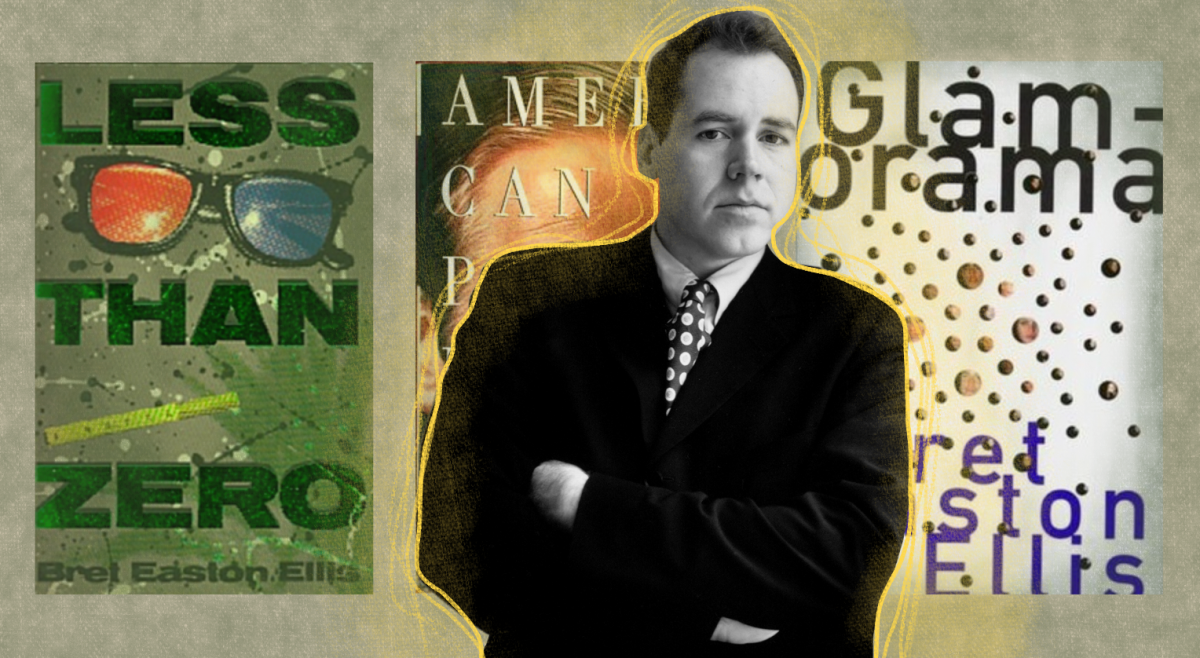
(Jashodhara Jindal / Heights Editor)
Bret Easton Ellis, the author of American Psycho, has fallen victim to the “TikTokifcation” of his works.
Patrick Bateman has become synonymous with the caricature of an ultra-masculine “finance bro.” Whether sincere or ironic, this movement has used the American Psycho protagonist as its figurehead online. This superficial yuppie is the only side of Bateman shown on the internet, and most don’t know the graphic details that fill American Psycho’s pages.
Ellis’ works, however, take on a much more eerie form that may reflect reality.
Imagine starting your day with 1,000 crunches, a multitude of skin products, and an ice pack. Bateman’s ritualistic routine has become a source of idolization for groups of impressionable young men on the internet. The designer suits, penthouse suite, and lavish lifestyle amusingly emulate the life modern-day youth want to live.
To a certain extent, Ellis wants Bateman to be presented this way. No one should suspect Bateman of committing any crimes—he’s a white, upper-class man who is highly educated in both fashion and culture. What motive would he have to stab a prostitute or axe his coworker?
Still, there is more at play in Ellis’ works than what is on the surface. Known for his satirical pieces on class and wealth, Ellis has been writing since his debut novel, Less than Zero, was published in 1985. The plot is messy, and his writing is juvenile, but the foundations of a literary commentator are there. Sparks of vulgarity are prevalent throughout, something Ellis doesn’t shy away from, especially in American Psycho.
In American Psycho, a picture-perfect man is sharply juxtaposed as he wields a weapon, graphically murdering someone in the following pages. Contrasts like these are implications of the real-life treatment of upper-class white men—inherently bad actions get swept under the rug. The hyperfixation on Bateman’s aesthetic is another variant of this process, as viewers disregard his serial-killer personality and focus on his morning routine.
Most of Ellis’ novels center around the 1980s and yuppie culture: affluent, career-focused, young people living in U.S. metropolises. But once you rip off the designer tag, who are these individuals?
What we as readers discover alongside him are shallow and empty humans who are, frankly, disturbing. Across a dozen novels, his characters get lost in a world of drugs, parties, sex, and, most shockingly, extreme violence.
Ellis has self-proclaimed himself a satirist with an affectless style of prose. For that reason, when the protagonist, Clay, and his friends watch a video of a young girl getting raped and killed in Less than Zero, not much emotion is conveyed.
In 2024, the Harvard Graduate School of Education published a podcast discussing the modern-day shift in young men away from emotional vulnerability. This is perhaps why they have gravitated toward Ellis’ characters, as these personas—like Clay and Bateman—are cold and distant. That disconnect from emotional sensibility makes all the acts of vulgarity in Ellis’ novels much more off-putting and seemingly all the more possible.
Ellis’ straightforward and precise writing mirrors the cleanness of the characters’ personas. They have high-end restaurants on rotation, constant familiar faces, and even their sex lives become monotonous. Perhaps that is why they find enjoyment in these extreme acts—they crave something more substantial, something money can’t provide them.
Money can’t buy you happiness, and for Ellis’ characters, money can’t even buy contentment. In Glamorama, a model with the hottest friends and best catalogs finds himself cycling through drugs and women, searching for something more fulfilling. No matter the facade, the interiors of Ellis’ characters are sick and perverted as a result of the world around them.
Ultimately, Ellis attempts to connect his world with ours. The upper echelon of our society is filled with opulence, empty souls, and prescription drugs. In his novels, he opens a small window into their world, perhaps a warning that not everything is how it seems.
While these characters present a grim reality, the phenomenon is nothing new. People have always used singular traits of characters as reference points while ignoring other key aspects—often those that are bad. Bateman will continue being the dignified “sigma” male until those who live online actually read the book.